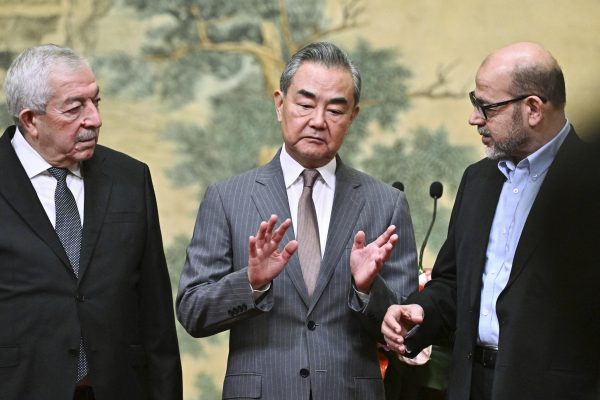“Knowledge! Knowledge! Knowledge! ― I can’t make bricks with out clay,” Sherlock Holmes was described saying in Sir Arthur Conan Doyle’s The Journey of the Copper Beeches.
For college kids of Indonesian politics, public opinion knowledge is the clay we have to make sense of this 12 months’s nationwide and native elections. The stakes are excessive: over the previous few years, Indonesia has skilled what many observers regard as a democratic erosion.
Think about the current Constitutional Court docket ruling that paved the best way for Gibran Rakabuming’s inclusion on the poll as a vice presidential candidate. Was this episode a easy case of elite politics and manoeuvring on the a part of Jokowi? Or does it replicate a declining public urge for food for the burdens related to the rule of regulation?
To reply these kinds of urgent questions, we’d like entry to publicly accessible survey knowledge. To make sure, there exist a number of such sources, together with the World Values Surveys (WVS), the Asia Barometer survey, the USAID Demographic and Well being Surveys, the Indonesian Household Life Survey (IFLS), and the Pew Middle’s examine of the World’s Muslims, to checklist some notable examples. However these surveys are usually one-off snapshots—a indisputable fact that undermines their utility for observing how Indonesians’ attitudes are unfolding in actual time and in response to exterior occasions. (The World Values Survey was most just lately carried out in Indonesia in 2018, for instance.)
With an eye fixed in direction of encouraging data-driven analysis, since November 2023 we now have been conducting weekly public opinion surveys, gauging the attitudes of 1,650 Indonesian adults every week. We are going to proceed to conduct weekly surveys till January 2025, aiming to survey roughly 95,000 Indonesian adults over the course of 58 weeks.
Importantly, we’ll make the information freely accessible to researchers. We name this initiative Excessive-Frequency Surveys on Indonesians’ Data of and Attitudes on Politics (HI-RES SIKAP). Under, we describe the survey design, the pattern, two use case examples, and how one can entry the information.
The design
The SIKAP mission attracts inspirations from the Nationscape examine run by the Democracy Fund and UCLA. As co-Principal Investigators, we contribute equally to the mission and want to acknowledge funding from the Singapore’s Ministry of Schooling and the Nationwide College of Singapore that has made the mission attainable.
The important thing element of SIKAP is the weekly on-line surveys that we now have been working and can proceed to run for a complete of 58 weeks, from 27 November 2023 to five January 2025. This era, as college students of Indonesia will instantly discover, covers a number of politically important occasions, such because the presidential election in February 2024, the inauguration of Prabowo Subianto as president in October 2024, and the simultaneous native elections in November 2024.
We developed a set of core modules which are requested throughout all 58 surveys. That the surveys have overlapping core questions, and are fielded weekly implies that SIKAP provides insights on how voters’ attitudes on a difficulty could change as a response to a political occasion.
As an illustration, we are able to theoretically study if there’s a rising sense of affective polarisation over the course of the election marketing campaign. It may be the case, as an example, that supporters of presidential candidates more and more develop into extra unfavorable towards one another.
Desk 1: Core Modules in SIKAP

Sampling strategies
Every SIKAP wave collects knowledge from a recent pattern of 1,650 respondents, supplied by the net panel vendor Cint (previously often known as Lucid). Within the ideally suited case, by the conclusion of the mission we could have collected knowledge from 95,700 distinctive respondents. Nevertheless, for a number of sensible causes, we enable respondents to be interviewed once more after eight weeks have handed since their final interviews.
This provides us one of the best options of cross-sectional and longitudinal knowledge. Aiming for a recent pattern in every wave allows us to seize a various pool of respondents. Permitting for a number of interviews, in the meantime, allows us to trace how social and political attitudes of re-interviewed respondents would possibly change over the course of 58 weeks.
On-line surveys aren’t consultant of the Indonesian inhabitants. Many citizens shouldn’t have web entry and the underlying components that drive such entry could also be correlated with the attitudes by which we’re thinking about measuring. For instance, our pattern is extra educated than the inhabitants.
Nonetheless, we prioritised implementing quotas that enabled us to realize representational parity on different essential variables: gender, age, and area. These quotas enhance the representativeness of our pattern and, on the identical time, nonetheless be sure that every survey wave can end in a single week.
Desk 2: Demographic Quotas in SIKAP
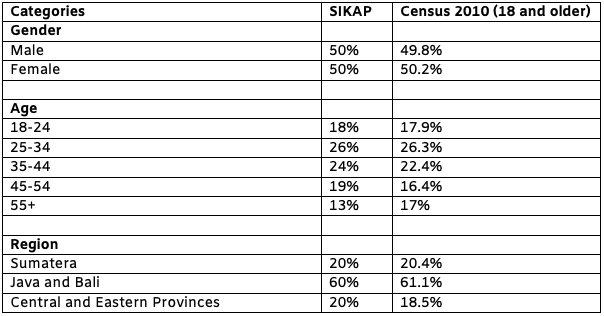
The dearth of representativeness of our pattern has important implications. Researchers who want to use our knowledge are solely answerable for the content material of their analyses, however usually we’d discourage utilizing the SIKAP knowledge to current easy descriptive statistics or to extrapolate these statistics to the inhabitants.
For instance, it’s not advisable for researchers to analyse our presidential vote choice query after which extrapolate that to argue for what number of voters help Anies Baswedan, Prabowo Subianto, or Ganjar Pranowo. That type of workout routines requires a unique kind of sampling methodology.
As a substitute, we imagine our knowledge is especially helpful for 2 sorts of workout routines.
The primary is to look at the pattern of a political perspective as a perform of time. For instance, a researcher would possibly study how, because the election date nears, heated non secular rhetoric would possibly result in extra exclusionary attitudes amongst voters.
Associated
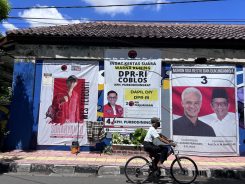
Indonesians desire a extra various legislature
A brand new survey reveals help for a category and gender combine that higher displays society.
The second kind of workout routines is to look at how a shock created by a big social or political occasion results in adjustments in tendencies of sure political attitudes. For instance, as we measure respondents’ attitudes towards China, the researcher would possibly study how these attitudes change after a reporting of China’s incursion into Indonesian territories within the Natunas.
These are simply few examples and, in the long run, completely different researchers would need to analyse the information in a different way. Under, we current two preliminary analyses that we now have completed on the information.
Use case: affective polarisation
How do supporters of a presidential candidate really feel towards supporters of different presidential candidates, and the way do these emotions change over the course of the election? This is without doubt one of the questions that we are able to study utilizing the SIKAP knowledge.
SIKAP contains questions on respondents’ presidential vote preferences. It additionally contains questions that faucet into the respondents’ emotions towards supporters of the three presidential candidates that competed within the February 2024 presidential elections. Respondents could point out their emotions towards supporters of every of the candidates on a 5-point scale that ranges from a powerful dislike to a powerful like.
Determine 1 presents ranges of affective polarisation among the many three candidates’ supporters from the primary week of SIKAP (27 November 2023–3 January 2024) to the tenth week (29 January 2024–4 February 2024).
Determine 1: Emotions between supporters of presidential candidates

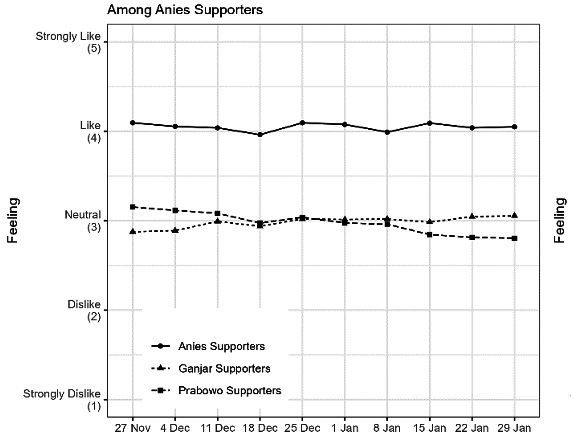
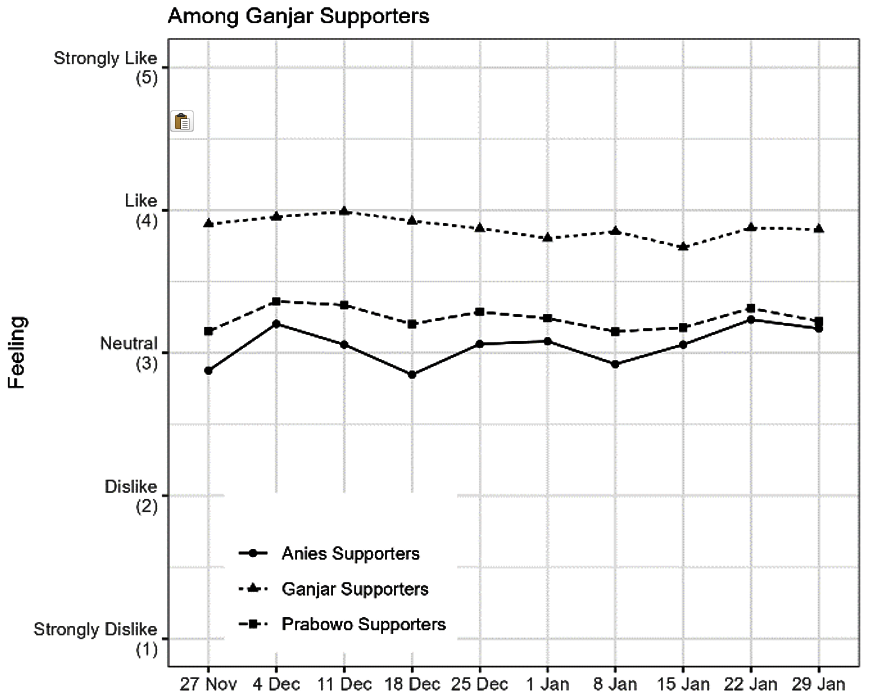
There are at the very least two notable patterns.
First, every candidate’s supporters really feel most beneficial towards fellow supporters. That is somewhat unsurprising. What’s fascinating, nonetheless, is that the sensation isn’t excessive―on common, a rating of 4 out of attainable 5. This implies that political campaigns don’t essentially induce partisans to develop into extra constructive or really feel extra beneficial towards their ingroup.
Second, amongst each supporters of Prabowo Subianto and Anies Baswedan, emotions towards supporters of Ganjar Pranowo are comparatively fixed within the ten weeks of the marketing campaign interval. They hover across the impartial level of three. In different phrases, Anies and Prabowo supporters neither like nor dislike Ganjar supporters.
On the contrary, we observe that Prabowo supporters’ emotions towards Anies supporters more and more develop into extra unfavorable, which is reciprocated by Anies supporters as their emotions towards Prabowo supporters additionally turned extra unfavorable in these 10 weeks. This sample is extra fascinating amongst Anies supporters.
Initially, Anies supporters considered Prabowo supporters extra positively than they did Ganjar supporters. Over time, this notion modified such that by early February Anies supporters really view Ganjar supporters extra favourably than Prabowo supporters. This sample would possibly really replicate how within the ultimate days of the marketing campaign Anies’s marketing campaign mounted an offensive towards Prabowo, highlighting for instance his enterprise offers, land possession, and lukewarm observe report as defence minister.
Use case: gender and generational politics in Indonesia
Appreciable consideration has been given to the position of the youth vote in Indonesia’s upcoming presidential election. For the primary time, a majority of voters will likely be millennials or gen-Z. That is having wide-ranging penalties for the way candidates are interesting to voters, and is broadly believed to have influenced Prabowo’s rebranding technique as a “cuddly grandpa.” To what extent is that this pivot working to sway younger voters?
Determine 2: Help for Prabowo by era
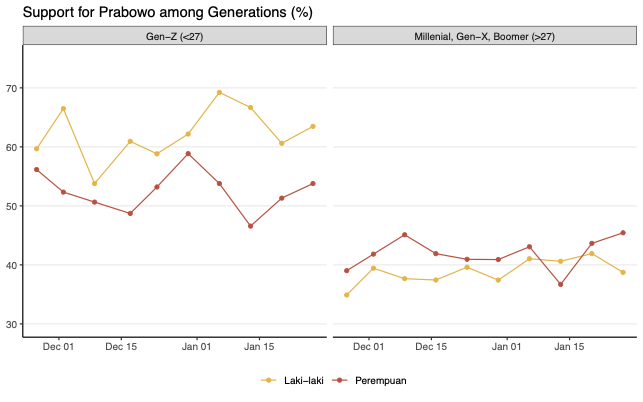
SIKAP knowledge permits us to look at this query in-depth. In Determine 3, we study the share of voters from completely different generations that help Prabowo. The primary takeaway that stands out is that Gen-Z voters are more likely to help Prabowo than older voters—by a margin of about 20 share factors. That is stunning in its personal proper: in comparison with older voters, younger voters aren’t typically thought to help candidates with authoritarian inclinations. The proof suggests this can be altering.
Digging deeper, we are able to study how generational variations work together with gender by way of help for Prabowo. Once more, what we observe on the right-hand panel of Determine 3 is that older women and men are equally as prone to help Prabowo—there are not any gender variations. However the left-hand panel reveals a stark gender divide: younger males are more likely to help Prabowo than younger girls.
The benefit of the high-frequency nature of the SIKAP knowledge is that we are able to pinpoint the second at which this gender hole emerges: till the primary week of January, younger women and men have been equally as prone to help Prabowo. However early within the new 12 months, help for Prabowo amongst younger girls dropped and help amongst younger males elevated—maybe as a consequence of the 7 January televised presidential debate.
Methods to entry
We welcome researchers, journalists, and different members of the general public to entry and analyse our knowledge for his or her analysis. Our knowledge is exclusive in its high-frequency nature and as such provides insights troublesome to acquire by analysing different datasets. On the identical time, we need to make a disclaimer that we’re not answerable for inferences drawn by different researchers utilizing our knowledge.
researchers could entry the information from our web sites nicholaskuipers.com or nathanael.id. For accountability functions we want to perceive who accesses our knowledge, so potential customers have to fill in a brief kind and enter their emails. The hyperlink to obtain the information will then be despatched to this e mail.
As the primary batch, we’re releasing Wave 1 to Wave 11. We are going to launch extra waves as the information develop into accessible. We hope that this easy train will assist create a path towards larger knowledge sharing and knowledge openness practices in Indonesia.



.jpg&h=630&w=1200&q=75&v=20170226&c=1)

